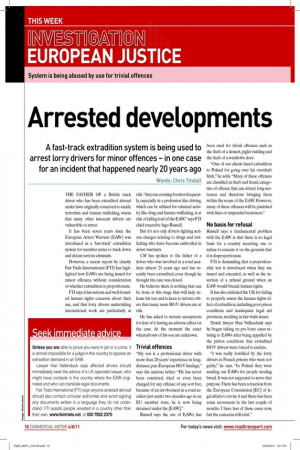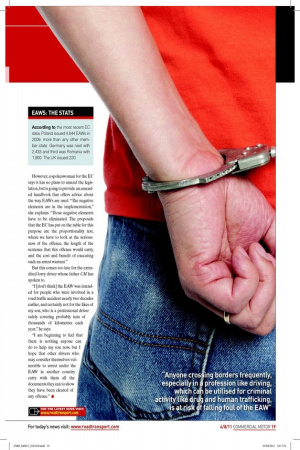Arrested developments
Page 16

Page 17

If you've noticed an error in this article please click here to report it so we can fix it.
A fast-track extradition system is being used to arrest lorry drivers for minor offences – in one case for an incident that happened nearly 20 years ago
Words: Chris Tindall
THE FATHER OF a British truck driver who has been extradited abroad under laws originally conceived to tackle terrorism and human traficking, warns that many other innocent drivers are vulnerable to arrest.
It has been seven years since the European Arrest Warrant (EAW) was introduced as a ‘fast-track’ extradition system for member states to track down and detain serious criminals.
However, a recent report by charity Fair Trials International (FTI) has highlighted how EAWs are being issued for minor offences, without consideration of whether extradition is proportionate.
FTI says it has serious and well-founded human rights concerns about their use, and that lorry drivers undertaking international work are particularly at risk. “Anyone crossing borders frequently, especially in a profession like driving, which can be utilised for criminal activity like drug and human traficking, is at risk of falling foul of the EAW,” says FTI chief executive Jago Russell.
But it’s not only drivers ighting serious charges relating to drugs and traficking who have become embroiled in arrest warrants.
CM has spoken to the father of a driver who was involved in a road accident almost 20 years ago and has recently been extradited, even though he thought the case was closed.
He believes there is nothing that can be done at this stage that will help release his son and is keen to inform others that many more HGV drivers are at risk.
He has asked to remain anonymous for fear of it having an adverse effect on the case. At the moment the exact whereabouts of his son are unknown.
Trivial offences
“My son is a professional driver with more than 28 years’ experience in longdistance, pan-European HGV haulage,” says the anxious father. “He has never been convicted, tried or even been charged for any offence of any sort but, because of an involvement in a road accident just under two decades ago in an EU member state, he is now being detained under the [EAW].” Russell says the use of EAWs has been used for trivial offences such as the theft of a dessert, piglet rustling and the theft of a wardrobe door.
“One of our clients faced extradition to Poland for going over his overdraft limit,” he adds. “Many of these offences are classiied as theft and fraud, categories of offence that can attract long sentences and therefore bringing them within the scope of the EAW. However, many of these offences will be punished with ines or suspended sentences.”
No basis for refusal
Russell says a fundamental problem with the EAW is that there is no legal basis for a country receiving one to refuse to execute it on the grounds that it is disproportionate.
FTI is demanding that a proportionality test is introduced when they are issued and executed, as well as the insertion of a refusal ground when an EAW would breach human rights.
It has also criticised the UK for failing to properly assess the human rights effect of extradition, including poor prison conditions and inadequate legal aid provision, resulting in fair trials issues.
Dutch lawyer Han Vallenduuk says he began taking on pro bono cases relating to EAWs after being appalled by the prison conditions that extradited HGV drivers were forced to endure.
“I was really horriied by the lorry drivers in French prisons who were not guilty,” he says. “In Poland they were sending out EAWs for people stealing bread. It was not supposed to serve that purpose. There has been a reaction from the European Commission [EC] of legal affairs to revise it and there has been some movement in the last couple of months. I have less of these cases now, but the concerns still exist.” However, a spokeswoman for the EC says it has no plans to amend the legislation, but is going to provide an amended handbook that offers advice about the way EAWs are used. “The negative elements are in the implementation,” she explains. “Those negative elements have to be eliminated. The proposals that the EC has put on the table for this purpose are the proportionality test, where we have to look at the seriousness of the offence, the length of the sentence that this offence would carry, and the cost and beneit of executing such an arrest warrant.” But this comes too late for the extradited lorry driver whose father CM has spoken to.
“I [don’t think] the EAW was intended for people who were involved in a road trafic accident nearly two decades earlier, and certainly not for the likes of my son, who is a professional driver safely covering probably tens of thousands of kilometres each year,” he says.
“I am beginning to feel that there is nothing anyone can do to help my son now, but I hope that other drivers who may consider themselves vulnerable to arrest under the EAW in another country carry with them all the documents they can to show they have been cleared of any offence.” ■















































